How to Create a Website like Booking.com?
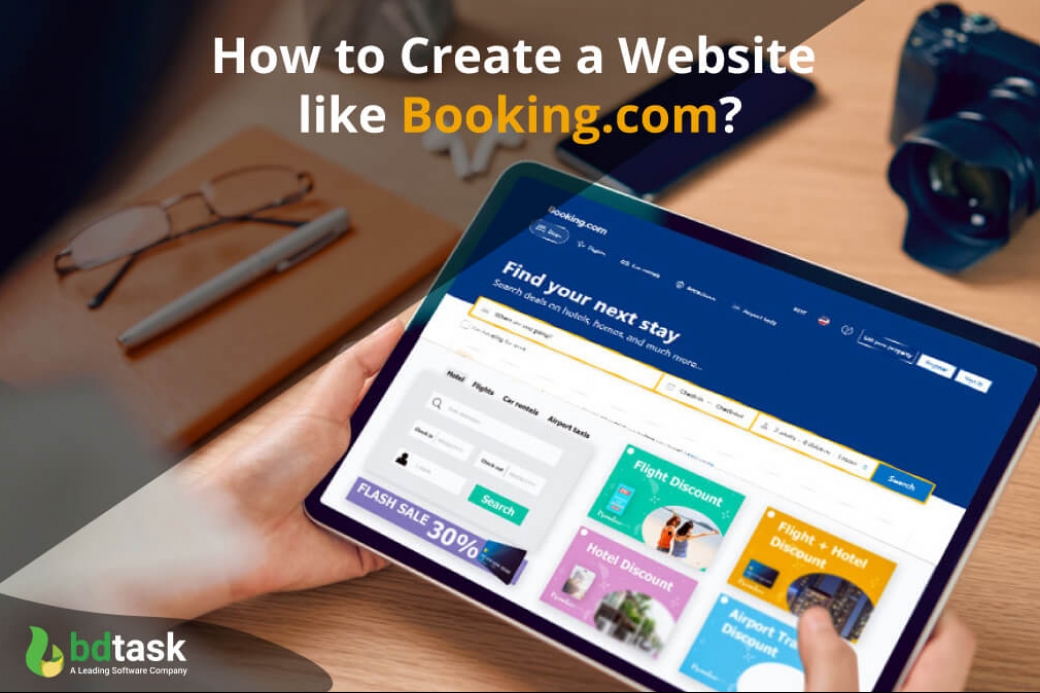
As the technology gets more and more advanced, people, especially the young generation, are getting more reliable on “online booking websites’” for booking their travel. Hence, this blog is about “How to Create a Website like Booking.com?”.
Honestly, traveling and booking a vacation online is now the new trend. And online hotel booking websites’ have eliminated the old-cliche style of “people standing in long query-line for tickets”.
Moreover, online travel marketplace like Booking.com, Expedia, and Kayak comes up with a one-stop convenient service for instance accommodation, flight tickets, room booking, transportation arrangements, and many more.
Before jumping into the main article, you can check out the exclusive Hotel Management Software
Based on Statista.com, about 88% of Americans preferred booking their travel online. Seeing such demand for such kinds of hotel booking websites among people, many entrepreneurs are building online booking websites like booking.com.
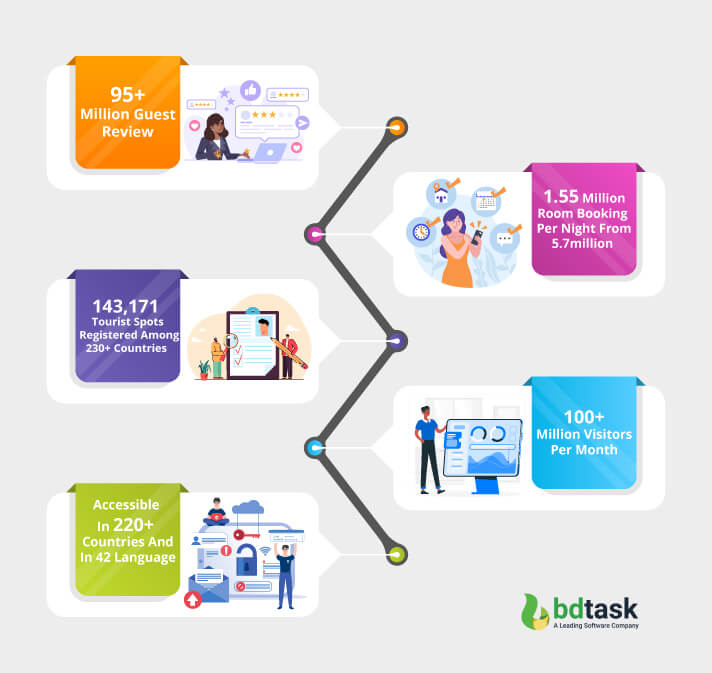
About Booking.Com
Booking.com is a travel metasearch engine or you can say a listing website. The main mission of Booking.com is to create an open platform so that everyone around the world can experience a dynamic online booking system.
Booking.com not only offers hotel booking services but also offers vehicle booking services and flight booking services.
Booking.com has been providing service all over the world for over 20 years, and till now they have engaged almost 950,000+ accommodation services worldwide.
Website-like Booking.com works with a simple process, for instance, the accommodation service owners will share their property information, and websites like booking.com show up all given property information categorically.
A website like Booking.com is an open and free website for travelers but not free for the accommodation service provider, Booking.com will charge a fixed amount fee per booking from the accommodation service provider.
How to Create a Hotel Booking Website like Booking.com?
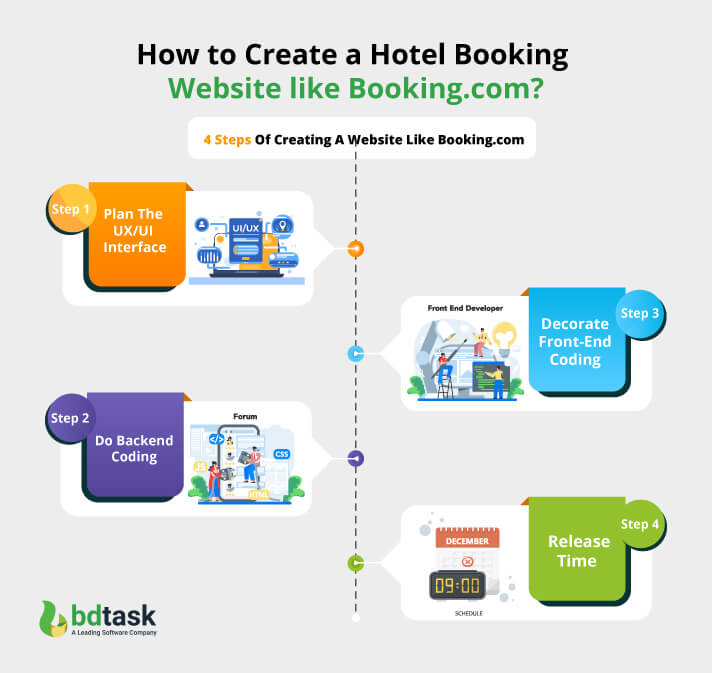
The main highlight of this blog is to gain knowledge about “how to create a website like booking.com”.
These 4 steps of creating a website like booking.com are very crucial because they might give you to some extent give you general knowledge of this concept.
Step 1: Plan The UX/UI Interface
Since you’re building an online traveling platform, you need to keep in mind that this website will be used by general people (population from any background), who might not understand your dynamic design.
Therefore it’s better to design your UX/UI interface, which is both user-friendly and attractive. Too many options and too many steps to follow might raise the bounce rate of your website.
Step 2: Do Backend Coding
The developer will sit with you, and will try to understand your vision, and based on that developer will architect your website. You just need to share the necessary features and modules of the reservation management system.
Develop will draft a model or graph of the websites, and after taking approval from you, the backend developer will start working. Backend coding is one of the crucial parts of a website. Developer construct server validations, hence creating a strong route between pages, fields, and security concerns.
Step 3: Decorate Front-End Coding
After the backend developer is done coding the backend of the website, now the frontend developer will transform the design into the code.
Frontend developers need to work cooperatively with the graphic design team in order to deliver the best product possible. Then the QC developer will test the products and fixate bugs and problems in your product.
Step 4: Release Time
After checking from the quality assurance department, the business developer will present the final copy to you. And you can use it from onward. And with trends, you also need to keep updating your featured and modules from time to time for better engagement with your targeted audience.
Approximate Cost Might Needs “How To Create A Website Like Booking.Com?”
Cost depends on how much you want to add, features, tools, design, functionalities, etc. The more complicated design you required the more cost it will take, and the more costly it will take.
Advantages of Creating A Website Like Booking.Com
Hotel booking websites like Booking.com have become one of the time-saving solutions for both travelers and hoteliers. Besides, if any hotel entrepreneur integrates this efficient hotel reservation system with the hotel website, they can easily gain a huge strategic advantage in the hospitality industry.
One of the common problems that most new hotel entrepreneurs face is that their hotel doesn’t get instant recognition by the potential travelers, as a result majorly affects the business growth.
Hence, tools like booking.com can help you manage your hotel operation, increase online visibility, boost productivity, and increase sales.
The primary purpose of the hotel reservation system is to automate the reservation procedure by synchronizing your hotel website with this sort of hotel reservation website like Booking.com.
And all of this is possible because of the online booking engine, and its automated technology, which helps you to eliminate non-targeted guests and make the total booking process seamless; no matter whatever the size is!
Some Essential Benefits Of Hotel Reservation Booking Website:
- Improves The Efficiency Of The Business
The thing that makes the whole process efficient is its instant update of the “room availability” across all online booking platforms and also hotel websites.
Moreover, this automated technology reduces the time and work of a front desk officer, eliminates the chance of overbooking, and smoothens the process of both pre and post-travel procedures. In conclusion, shift all the manual tasks into an automation system.
- Assist To Gather Initiative Data For Your Business
Integrating the hotel booking engine with the hotel booking website opens up the opportunity for monitoring and recording the booking information. An advanced way to operate your hotel intelligently.
Hotel booking engine software contains some smart analytics that will automatically track the customer's full profile, interests, service they demand, customers' lifestyle, and how often they like to travel.
And collecting inside data of customers will help you to plan the marketing campaigns more effectively.
- Improves Revenue
Yes, websites like booking.com can help you to improve your efficiency, let me tell you how??
Before the technological advancement, hoteliers used to receive multiple phone calls for room reservations but because of the efficient hotel booking engine, now the hoteliers don’t have to receive multiple calls from travelers to confirm their booking.
Must-Have Features While
Create A Websites Like Booking.Com
Features are the only thing, that will make a website like booking.com dynamic, smooth, user-friendly, and attractive. Booking.com has separate features for customers and hoteliers service providers.
For Customer Usability
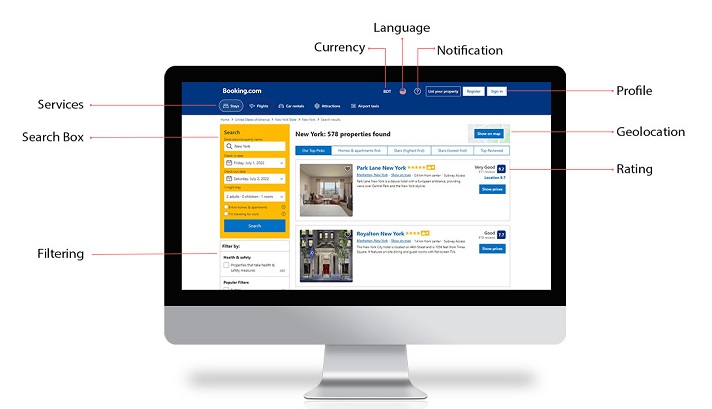
- Sign-In / Sign-Up
Booking.com kept the “sign-in /sign-up” procedure the easiest way since various types of people will access it. Users can register on booking.com using Facebook ID or Gmail ID, as a result, you can avoid the traditional way of filling out the sign-up form.
- Personal information
This section is usually for user-using purposes. And whenever users upload or share any review, comment, photos, etc, that profile will be viewed, by the websites like booking.com. Personal information might include;
- Profile picture
- Name
- Age
- Gender
- Profession
- Country
- Time duration spend online
- User dashboard
This section is also mainly for users. This section is utilized for saving customers' booking information, reviews users have posted, and wish lists. Moreover, users can change or update their information in the profile anytime.
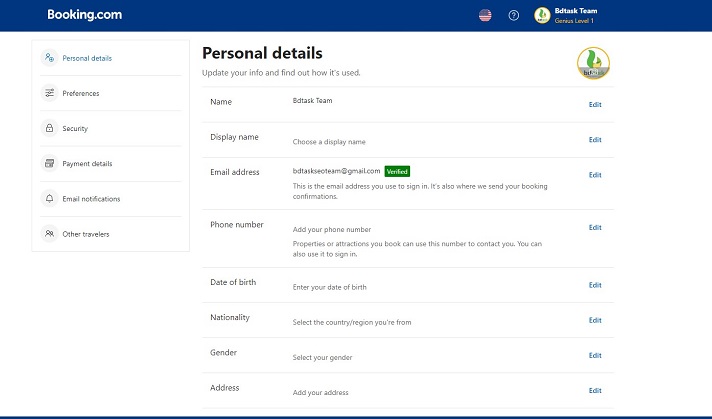
- Search Bar
Booking.com kept its search bar the most simple and easy-to-navigate way. To use the booking.com search bar, users must have information about the destination, date, number of travelers, and rooms. Moreover, booking.com provides a high-level filtering process in its search bar, to make the search fast and accurate.
- Geographical Location
Yes, booking.com will ask for permission to use the IP address. And the reason behind it is that booking.com can identify the user's location and send notifications location-wise personalized offers.
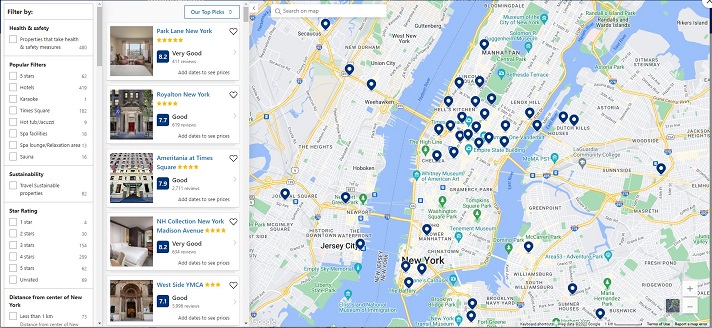
In addition, websites like booking.com provide integrated map facilities, so that users can search for landmarks and hotels. As a result, becomes easier for the users to find the specific address or get different accommodation suggestions near users.
- Rating And Review
Nowadays before purchasing anything, “reviews and rating” is the most asked thing by the users. Rating and review create a space of trust among travelers and also encourage hoteliers to improve their service. Reviewing one rating another travel can book their stay.
Booking.com, self provides real reviews and ratings, measured based on the users' popularity. Booking.com provides ratting on price, review score, most picked by the users, quality, etc; and whenever any users open any particular hotel the rating will display and help travelers to decide their stay.
- Notification
Booking.com uses email or SMS ways to share different promotional information, campaigns, coupons, special deals, and recommendations. Hence booking.com always keeps re-generating and engaging with the audiences with a website like booking.com.
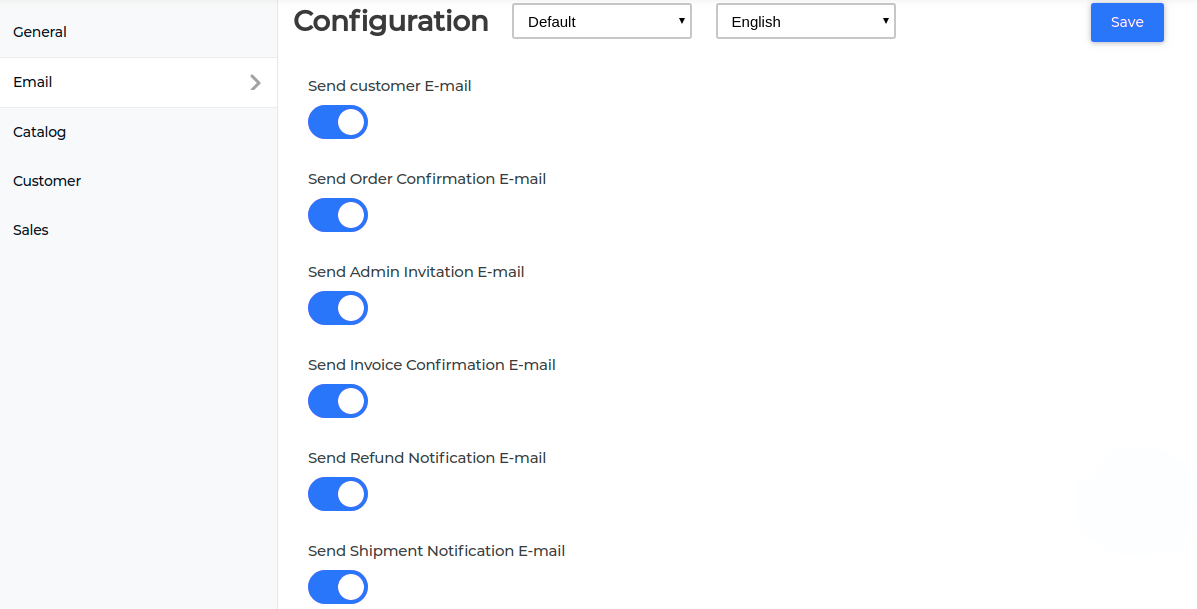
Hotelier Feature
- Property Management module
In this module, hoteliers first have to have to create and register their property, whichever they need to showcase for rent. Hotel owners have the full freedom to add and remove their property on booking.com. This module also gives the opportunity for the hoteliers to add information such as:
- Property size
- Description
- Facilities
- Payment details
- Photos
- Availability
- Booking Management Dashboard
A complete reservation tab, where hoteliers and property owners keep track of all the booking details. And whenever any users make any bookings or confirmed their registration, immediately from the property owner's side, they will confirm the booking to the users. Through this booking management dashboard, property owners can manage all the bookings or cancel any booking with or without being charged by the users.
- Notification
When the users confirm any reservation on booking.com, the hotelier or the property owner gets an immediate notification through email or the Pulse app.
Easy Tricks To Make Money On Booking Sites
Below, we’re introducing three business models to help websites like booking.com generate revenue faster.
- Advertising Business Model-
The advertising business model is completely a revenue model and totally depends on the cost per click(CPC) policy. One of the best examples to describe the “advertising business model” is Trip advisor. Trip advisor follows an advertising business model, as a predominant revenue stream.
And whenever any user clicks on a link, the advertiser owner pays the trip advisor fixed fees, and at the same time will take users to the advertiser page from the trip advisor website.
- Merchant Business Model-
One of the best examples of a “merchant business model” is Expedia.com. Expedia.com is a travel booking website, that acts as a merchant, they buy hotel properties such as rooms, facilities, etc, and resell those on their websites or app. Usually, Expedia.com follow the merchant business model but also follows other models too such as advertising business, model and agency business model.
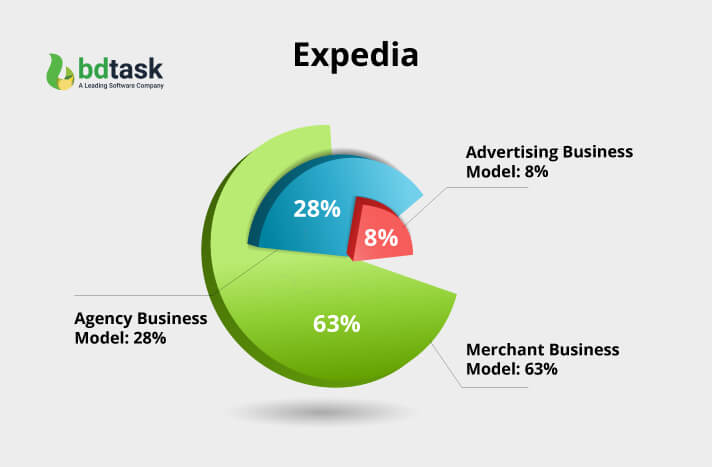
- Agency Business Model-
A website like booking.com best describes the “agency business model”. It explains the situation elaborately, I have to say Booking.com plays a travel website bridge between travelers and service providers and in exchange charges a fixed amount of commission on every transaction.
Booking.com follows an agency business model, hence different hotelier or property owner allows booking.com to showcase or list their products for faster reach to the customer.
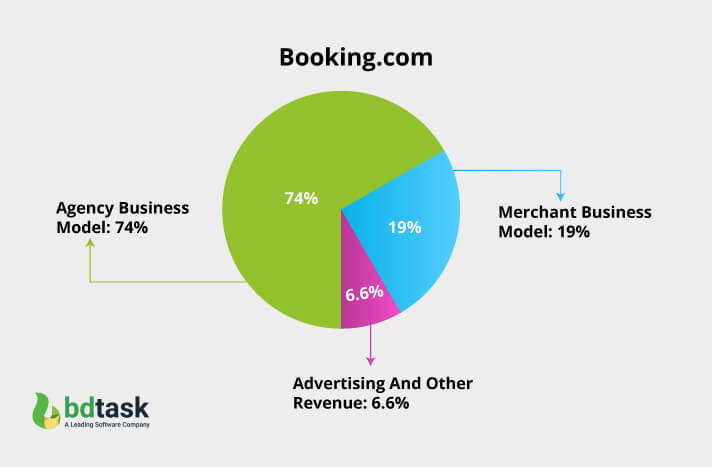
Pre-Requisite To Check Before Creating A Hotel Booking Website Like Booking.Com
I think before you know “how to create a website like booking.com”, you should know and fulfill the pre-requisite steps before creating a website like booking.com.
Below, I have described some essential points which might become your major obstacles on the way to success. And most importantly you need to understand and find out, “what your targeted customer wants?”, “What is the customer's pain point?” and the market gaps.
-
Analysis Your Competitor
Booking.com is not the only traveling OTA this the tourist industry; in fact, booking.com itself is competing with Trip Advisor, Airbnb, HomeAway, Trivago, etc. But the most amazing part is that all those traveling OTA serves different niches to their targeted customer.
Hence, if you are eager to create a website like booking.com, you also come up with at least one distinctive advantage, or niche and make that your core competitive advantage for your platform.
The niche must be unique, especially to your competitors. The better you can create a unique strategy than your competitor, the more chance the chance of becoming successful.
One of the best ways is to target a specific niche, as a result, it becomes easier for you to identify their needs, pain points, behavior, lifestyle, etc. Therefore, would be better to construct the marketing and business strategy.
-
Confident With Your Idea
Yes, it’s risky for start-ups in this tourist industry, as this industry is already saturated. But if you’re confident with your business & marketing plan. Plan your game, based on your targeted customer, which will solve the customer pain point that they’re facing on other travel websites like booking.com, trip advisor, Trivago, etc.
-
Offer Discount
Since you’re new in the market, it’s obvious, that you’ll face a major lacking of customer reviews, and ratting on your website. Hence to attract customers to your website, you can post and apply various marketing to drive your targeted customers.
In the initial stage of your OTA platform, you just need to spread awareness about your traveling platform, and what kind of service you are providing; your job is to just spread information about your service, and products. In the initial stage, it’s better not to expect so much revenue, instead focus on customer engagement and sustainability in the marketplace.
Conclusion
How to create a website like booking.com? At present, Booking.com is one of the most popular travel booking websites. Booking.com is now one of the most reviewed, preferable, and reliable choices by travelers.
And if you wanna create a website like booking.com, it won’t be an easy job to position yourself in the position, where booking.com is now. But, if you dedicatedly follow your unique niche, you definitely can catch your targeted goal.
Read Also











